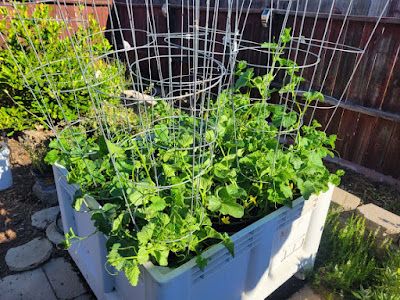In 2022, as I was driving back from a local produce stand called Larry’s, I saw the large cubic yard grape harvest macro bins for sale. That gave me some ideas. After calling the phone number to find out the price and looking at the price online, I decided to buy some. Even if they didn’t work for planting, they would work great for the bulk organic planting mix I often buy.
The owner of the harvest bins was a very old Italian farmer by the name of Joe. He had been cultivating and living in Suisun Valley, Fairfield, California for well over half of the last century. In fact, the Larry of Larry’s produce had known Joe for much of his life and had learned a lot his agricultural skills from him. While Larry was now helping Joe out with some of his farming, Joe was no longer needing the harvest bins. Having measured the cubic bins, I was still not sure if one would fit in my van – but after wrestling the container up to the back of my 2004 Toyota Sienna, I determined that, with the back seats down, I could just barely slide the container in.
Over the course of a month or two I purchased three more harvest macro bins, making a total of four. Once the weather cooled down, I drilled out the holes in each of the bins for drainage. This was not only important for growing plants in, but really helped with draining out the water that accumulated in the bins during our wonderfully wet winter.
It turns out that the bins helped to solve a number of the previous concerns I had with my remote gardening model. For one, the bins last a really long time and are a perfect size for a small cucumber or melon crop. Given the cost of lumber and the fact that many wooden-sided gardens don’t always hold up, I perceived that I could get a lot of milage out of the grape harvest bins before they degraded. There was also the white color. It gets very warm in the summer and the light color really helps the roots to not get overheated. Above all, the bins were relatively light and required no assembly on my part. My amateur handyman skills and the need to possibly relocate the bins combined with the need to use my time effectively made these harvest bins the ideal solution.
So I began setting up the white bins (lets rename them cubic planters) out on different properties. I started with the property I had already grown two crops in from the previous year. This was done in a 1-yard macro tote of the same general size and shape and color as the cubic planters. I unloaded the tote the best I could in 5-gallon buckets, slid the tote aside, then laid down some weed fabric cut to size and secured it with landscape staples. The cubic planter was then slid into place and the soil from the tote was transferred into the planter. The soil was an organic soil mix that I had purchased from a local organic soil company.
This method was repeated with two other gardens. The first was a couple from the Solano Ag Club. They let me use an area of their yard that received good sun. Again, I laid the weed fabric and secured landscape staples prior to putting in soil. Then I was able to get a couple I knew from church to sponsor a cubic planter. They had allowed me to grow in some 5-gallon buckets the previous year and this year would be much easier with the plants being watered automatically.
The final bin was used after I was informed that the Dark Armenian cucumbers (or Tortarello Barese Scuro) that I was hoping would be grown by a contract farmer was not grown. As I had been waiting nearly a year for this variety, I decided to grow it out myself. So that is how I came to grow in “cubic planter” one-yard macro grape harvest bins.
Overall, I would have to say that the cubic planters have done wonderfully well this first year. I am so grateful that I was able to find this solution. They are easy to move from place to place and provide flexibility with planting locations while keeping my cucumber varieties isolated from each other.

















No comments:
Post a Comment
Dear Gardening Friends,
I look forward to learning more about gardening with you. Your comments help me recognize that gardening is a life-long journey.
To advertisers: Note that this blog is concerned with gardening and gardening techniques. Please do not attempt to advertise here by leaving a comment. Depending upon how egregious the comment is, it may be deleted.